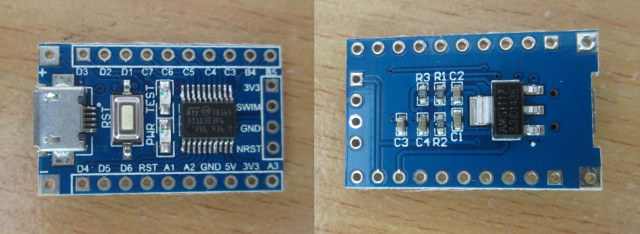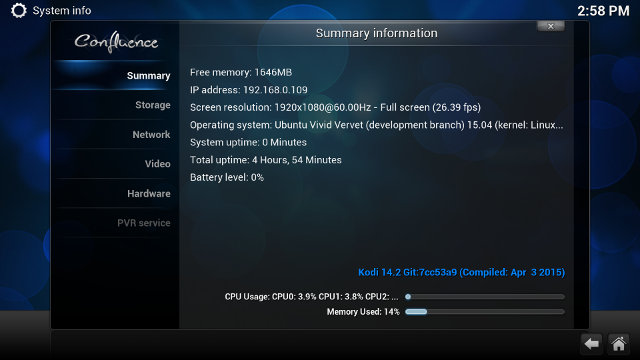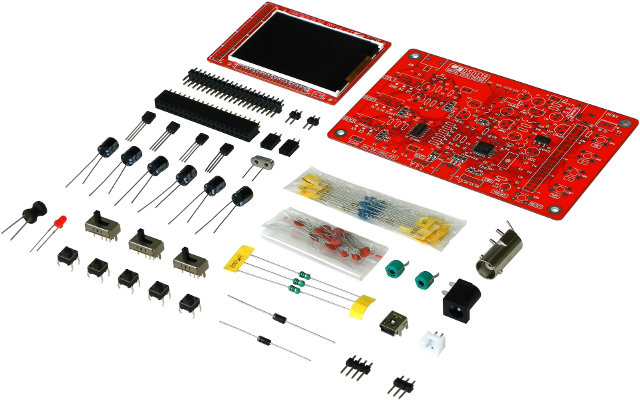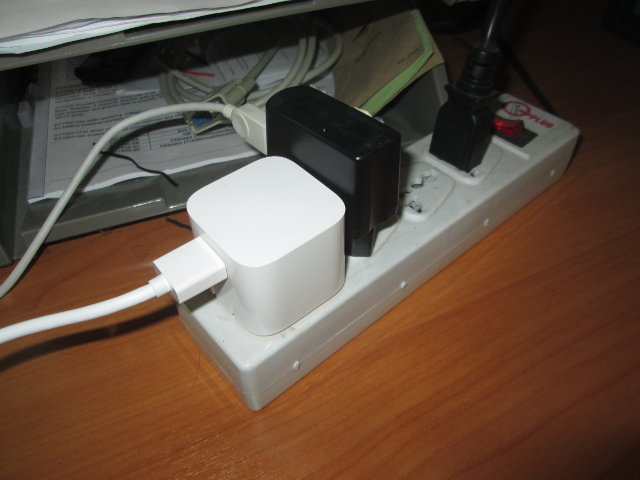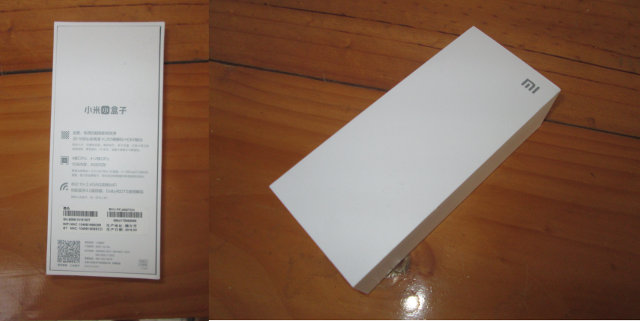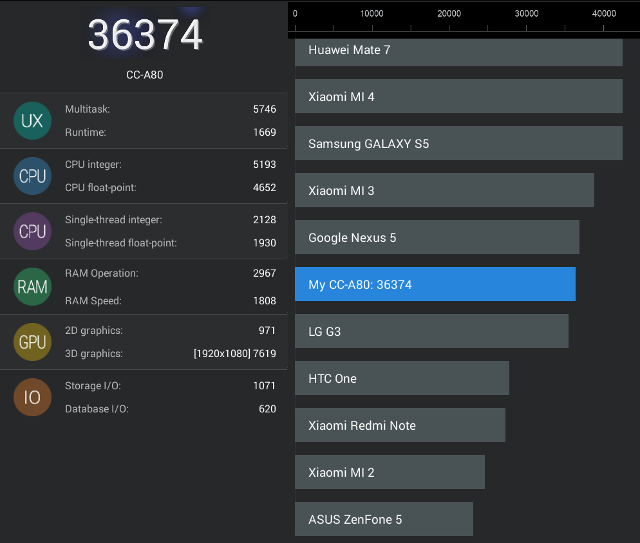In January, I discovered there was such thing as a one dollar development board based on STMicro STM8S103F3P6 8-bit MCU with 1KB SRAM, 8KB flash, and 640 bytes EEPROM, some GPIOs as well as I2C, UART, SPI, ADC, and PWM signals. Links to documentation and source code were provided, but development tools were only Windows based. However, one of my reader informed me SDCC (Small Devices C Compiler) supported STM8, and development in Linux should be feasible. So I decided to buy the board on eBay for $1.62, as well as an ST_link V2 programmer for STM8 / STM32 for $4.52 in order to flash the firmware. The board came pretty quickly, i.e. within 2 to 3 weeks. But due to a lost package, the programmer took nearly 3 months to reach me, as the seller had to re-send after I failed to receive it within 2 months. It comes […]
Kodi 14.2 Linux Tested on MeLE PCG03 with Ubuntu 15.04
I’ve already tested Kodi 14.1 on MeLE PCG03 running Windows 8.1, with the Intel Atom Z3735F device performing greatly for 1080p videos, working DTS and Dolby pass-through (no HD Audio though) and automatic frame rate switching working at all frequencies I tested. Later I installed Lubuntu 15.04 on the mini PC, and I had planned to test Kodi 14.x in Linux to compare the performance in Windows 8.1. Unfortunately, I did not manage to mak HDMI audio, nor the audio jack work in Linux, so instead I purchased a cheap USB sound card from DealExtreme for around $2 US, and connected a pair of USB powered speakers to enable audio output. The USB sound card performs pretty well, and out of the 80 or so videos I used for testing, only one had some saturation issues likely due to the sound card itself. I installed Kodi 14.2 using the recommended […]
JYE Tech DSO138 is a $23 DIY Oscilloscope Kit
Back in 2012, I was pleasantly surprised when I discovered they made Digital Storage Oscilloscope (DSO) for less than $200, and today, you can find several oscilloscopes for less than $100, albeit with limited performance, such as DS201. But if you don’t need a high speed DSO and just want to have some fun, JYE Tech DSO138 is a single channel oscilloscope DIY kit that you need to assemble yourself, and sells for just $23 on Banggood, or about $30 on Aliexpress, or Ebay. DSO138 key specifications: MCU – STM32F103C8 ARM Cortex-M3 processor Display – 2.4 -inch color TFT display Analog bandwidth – 0 – 200KHz Sampling rate – 1Msps max Sensitivity – 10mV/Div – 5V/Div Sensitivity error – < 5% Vertical resolution – 12-bit Timebase – 10us/Div – 500s/Div Record length – 1024 points Input impedance : 1MΩ Maximum input voltage : 50Vpp (1:1 probe), 400Vpp (10:1 probe) Built-in […]
Xiaomi Mi Box Mini Review
After showing pictures of Xiami Mi Box Mini, it’s now time for a “review”, but a bit different from my other reviews, as Xiaomi tiny media player is much different. First the firmware is in Chinese only, and there’s only one external port HDMI output. So first I’ll show the user interface is Chinese, then explain how you can install your own Android apps, and finally run some benchmark to evaluates Mediatek MT8568, Wi-Fi and storage performance. Xiaomi Mi Box Mini Setup and Chinese User Interface The device is super small, but in my case it was almost too big, as it takes enough space to potentially cause problems with the adjacent plug. This little issue will of course depend on your power extension. You then need to connect the 1.5 meter HDMI cable, which should be long enough for most setups, and you’ll see some guide asking you to […]
Xiaomi Mi Box Mini Unboxing
Xiaomi Mi Box Mini is probably the smallest Android media player available so far. It integrates a 100-240V power supply, and only features a single HDMI output port, no micro SD slot, and no USB ports. Although the device is primarily targeting the Chinese market, with a Chinese user interface and CCC certification only, several Chinese e-retailers have started to offer it for $50 or less. GearBest sells it for $42.98 with coupon MIBOX, and they’ve sent me a sample for review. Today, I’ll post some pictures of the device, before doing a review, including trying to switch to a user interface in English. Mi Box Mini Unboxing I’ve received the package via DHL, and for once I did not have pay custom duty or other tax. On the back of the package, they listed some key features in Chinese, such as H.265 1080p video playback, quad core processor, hexa […]
Cubieboard 4 Ubuntu Review – Setup, Usability, and Performance
Cubieboard4 is a development board powered by Allwinner A80 octa-core processor with 2GB RAM and 16GB eMMC. I’ve already shown how to get started with the board using the pre-installed Android 4.4 image, and run some benchmarks in Android, so now it’s time to check out the Ubuntu Linaro 14.04 image provided by CubieTech. I’ll show how to install and setup Ubuntu 14.04 on the board using a micro SD card, run desktop applications like Chromium, Libre Office, and son on on the board, and complete the review with some Linux benchmarks. Setting up Ubuntu on Cubieboard4 Firmware images for Cubiebord4 can be downloaded @ http://dl.cubieboard.org/model/cc-a80/Image/. Currently Android 4.4, Debian server, Ubuntu Linaro server, and Ubuntu Linaro desktop with LXDE desktop environment. That’s the latter I’ll use for the experiment, and two images are available: linaro-desktop-cb4-card-hdmi-v0.4.img.7z – Bootable image from micro SD card linaro-desktop-cb4-emmc-hdmi-v0.4.img.7z – Installation image to eMMC to […]
Linaro 15.03 Release with Linux 4.0 and Android 5.1
Linaro has just announced their 15.03 release with Linux 4.0-rc4 (baseline), Linux 3.10.72 and 3.14.36 (LSK), and Android 5.1. The organization has worked on hardware platforms from members namely Qualcomm, ARM, HiSilicon, Samsung, and STMicro, including the recently announced 96Boards boards, and other ARMv8 platforms. Highlights of the release: Linux Linaro 4.0-rc4-2015.03 updated linaro-android topic added a few build/boot fixes for Arndale (llct-misc-fixes topic) GATOR topic: version 5.20.1 updated integration-linaro-vexpress64 topic by ARM LT (FVP Base and Foundation models, and Juno support) updated topic from Qualcomm LT (ifc6410 board support) simple EEPROM framework (via Qualcomm LT’s topic) updated topic from HiSilicon LT (Hi36xx, HiP04, and X5HD2 families support) rebased “ILP32 patch set v3” onto 4.0-rc2 Linaro builds of AOSP 15.03 updated all the baselines to AOSP 5.1 added commit based trigger feature to CI builds Linaro OpenEmbedded 2015.03 integrated Linaro GCC 4.9-2015.03 dismantled meta-aarch64 layer created meta-ilp32 layer cleaned out […]
Cubieboard4 Benchmarks in Android
Last time I tried running benchmarks in an Allwinner A80 board (A80 OptimusBoard), it either rebooted during the benchmark, or had fairly disappointing results for example for USB storage. I documented my findings in a post entitled “Current Performance and Stability Issues on AllWinner A80 OptimusBoard Development Board” which was written in October 2014. But a few months have passed, and since Cubieboard4 is another hardware platform, so I was interested in running benchmarks including storage and networking performance testing on the new board to see if any progress was made. Cubieboard4 Android Benchmarks – Antutu, Vellamo, and 3DMarks Manufacturers can add the key ro.sys.hiritsu to build.prop in order to artificially inflate their Antutu scores with Allwinner A80 processor. So before running Antutu, I checked /system/build.prop in the firmware, and found out no trace of this variable, which can only be good for CubieTech reputation. CC-A80 board, the other name […]


